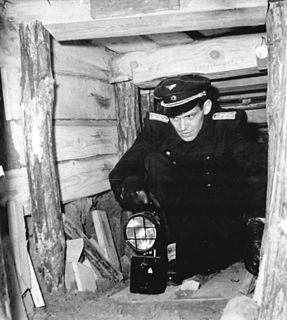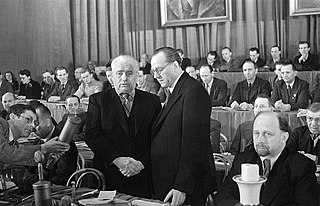
The Publicly Owned Enterprise was the main legal form of industrial enterprise in East Germany. They were all publicly owned and were formed after mass nationalisation between 1945 and the early 1960s, and the handing back in 1954 of some 33 enterprises previously taken by the Soviet Union as reparations.

Republikflucht was the colloquial term in the German Democratic Republic for illegal emigration to West Germany, West Berlin, and non-Warsaw Pact countries; the official term was Ungesetzlicher Grenzübertritt. Republikflucht applied to both the 3.5 million Germans who migrated legally from the Soviet occupation zone and East Germany before the Berlin Wall was built on 13 August 1961, and the thousands who migrated illegally across the Iron Curtain until 23 December 1989.

Hilde Benjamin was an East German judge and Minister of Justice of the German Democratic Republic. She is most most notorious for presiding over the East German show trials of the 1950s, which drew comparisons to the Nazi Party's Volksgericht show trials under Judge Roland Freisler. Hilde Benjamin is particularly known for being responsible for the politically motivated prosecution of Erna Dorn and Ernst Jennrich. In his 1994 inauguration speech German President Roman Herzog cited Hilde Benjamin as a symbol of totalitarianism and injustice, and called both her name and legacy incompatible with the German Constitution and with the rule of law.

NKVD special camps were NKVD-run late and post-World War II internment camps in the Soviet-occupied parts of Germany from May 1945 to January 6, 1950. They were set up by the Soviet Military Administration in Germany (SMAD) and run by the Soviet Ministry of Internal Affairs MVD. On 8 August 1948, the camps were made subordinate to the Gulag. Because the camp inmates were permitted no contact with the outside world, the special camps were also known as silence camps.
The Wittorf affair was an embezzlement scandal in Germany in 1928. John Wittorf, an official of the Communist Party (KPD), was a close friend and protégé of party chairman Ernst Thälmann. Thälmann tried to cover up the embezzlement, for which he was ousted from the central committee. Joseph Stalin intervened and had Thälmann reinstated, signaling the beginning of a purge and completing the Stalinization of the KPD.

The Art Prize of the German Democratic Republic was an East German state award bestowed on individuals for contributions in various fields of art.

The Communist Party of Germany (KPD) and the Social Democratic Party of Germany (SPD) merged to form the Socialist Unity Party of Germany (SED) on 21 April 1946 in the territory of the Soviet occupation zone. It is considered a forced merger. In the course of the merger, about 5,000 Social Democrats who opposed it were detained and sent to labour camps and jails.
Ilko-Sascha Kowalczuk is a German historian and author. His work is focused on the German Democratic Republic and its Ministry for State Security.
Margarete "Grete" Fuchs-Keilson was a German politician and official in the Communist Party of Germany (KPD) and the Socialist Unity Party of Germany (SED).
Michael F. Scholz is a German university professor in modern and contemporary history, currently (2015) based in Sweden.
Helmut Alfred Brandt was a Berlin city councillor and a leading German politician in the Christian Democratic Union , a political party of the centre right.
Emmi Dölling was a Czechoslovak/German political activist (KPD/SED) and journalist.
Fritz Zeuner (1921-1982) was an East German politician, who was Chairman of the Peasants Mutual Aid Association from 1979 to 1982.
Philine Fischer, néeFranke, married name Sannemüller was a German opera and concert singer (soprano).

State elections were held in the Soviet occupation zone of Germany on 20 October 1946 to elect the state legislatures of Mecklenburg-Vorpommern, Brandenburg, Saxony, Saxony-Anhalt and Thuringia. They were the only elections held in the future territory of East Germany before the establishment of the German Democratic Republic in 1949, and the only free and fair elections held in postwar East Germany before the Peaceful Revolution.
Musik und Gesellschaft was a music magazine in the German Democratic Republic. It was published monthly from 1951 to 1990 in East Berlin by Henschelverlag.
Rudolf Neuhaus was a German conductor.
Harry Weibel is a German historian. His main topics are neo-Nazism, right-wing extremism and antisemitism in the GDR and racism in Germany from 1945 to the present.

Jean Kurt Forest was a German violinist and violist, Kapellmeister and composer. He began his career as concertmaster in film orchestras conducted by Paul Dessau, then played principal viola in Frankfurt and Hamburg. Drafted to the Wehrmacht in 1942, he defected to the Red Army in 1945 and remained a prisoner of war until 1948. Back in East Berlin, he shaped musical life in the GDR in several positions, before he focused on composition from 1954, composing political songs and operas raising social awareness.
Dieter Hebig is a German archivist and historian.







